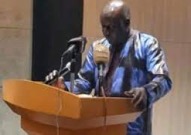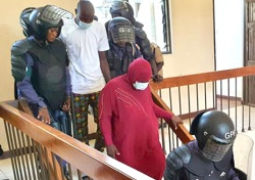
Dr Amat Bah said they are hoping that the Cash Transfer and Social and Behavioural Change Communication (SBCC) would have a lasting impact on the lives of the beneficiaries.
He noted that one of the successes they have in the project is that they were able to pilot it in three districts of Foni Bintang, Nianija and Wuli West Districts.
“And all the things we have learnt from the pilot had helped us to make sure the rollout is effectively done,” he added.
The project, he added, is for one-year-six months but they are looking for more resources and are hopeful that they will get it to be able to implement the project for 3 years to be able to assess the impact on how people have been moved from extreme poverty to probably out of poverty.
“Data has been collected from 30 districts and we are hoping that we will be successful in getting more resources to ensure wherever there is a household that is considered to be extremely poor in the country is assisted to get out of that extreme poverty.” he stated.
Dr Bah pointed out that the money given is an unconditional cash transfer and they are not restricting anybody as to how to spend their monies, except that they have been identified as extremely poor households, thus the need to assist them out of their extreme situation.
Dr Bah thus appealed to beneficiaries to use the money wisely so that they are able to sustain themselves when the project ends.
“The project will finish but we want by the time it ends households to have something that they will be able to sustain and keep themselves out of poverty.”
Dr Bah noted that NaNA is into the project because they know that the underlining cause of malnutrition is poverty, noting that if the ‘Nafa’ is going to get people out of poverty then they should be interested in ending malnutrition.
The ‘Nafa’ program, a component of The Gambia Social Safety Net Project (SSNP) is a US$ 31 million project being jointly funded by the World Bank and the Government of The Gambia. The programme is designed to promote continuity and harmonisation with other programs, by expanding an existing package of cash transfers with Social and Behavioural Change Communication (SBCC) managed by NaNA and partners.
The National Nutrition Agency (NaNA), Directorate of Social Welfare and Department of Community Development are the implementing partners of the ‘Nafa’ Program.
It is being implemented in West Coast (WCR), Central River (CRR), North Bank (NBR), Lover River (LRR) and Upper River Regions (URR) targeting 15,606 extremely poor households.
The SBCC provides information to beneficiaries and non-beneficiaries to encourage investments that can bolster human capital especially maternal and child health and nutrition, adolescence education and family planning; parenting and prevention of gender-based violence; and productive capital especially savings, entrepreneurship and agriculture to break the inter-generational cycle of poverty.
In the three piloted districts, a total of two thousand, seven hundred and seventy (2,770) beneficiary households each received D3,000 every two months during the seven rounds of payment.





